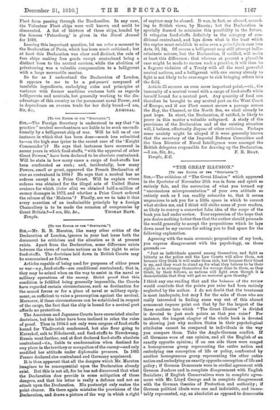[TO THE EDITOR OF THE "SPECTATOR " ] SIR, —Mr. R. B. Marston,
like many other critics of the Declaration of London, ignores in your last issue both the document he criticises and the situation as it at present exists. Apart from the Declaration, some difference exists between the views of various nations as to the right to seize food-stuffs. The doctrines laid down in British Courts may be summarised as follows.
Articles capable of being used for purposes of either peace or war—e.g., food-stuffs—are conditional contraband; that is, they may be seized when on the way to assist in the naval or military operations of the enemy. Strict proof that this condition is fulfilled being generally impossible, the Courts have regarded certain circumstances, such as destination for the armed forces or for a place of naval or military equip- ment, as sufficient to raise a presumption against the neutral. Moreover, if these circumstances can be established in respect of the cargo, the fact that the ship is bound for a neutral port affords no protection.
The American and Japanese Courts have enunciated similar doctrines, but the latter have been inclined to relax the rules of proof. Thus in 1904-5 not only were cargoes of food-stuffs bound for Vladivostok condemned, but also flour going to Korsakof, salt to Nikolaevsk, and food-stuffs to Newchwang. Russia went further, and at first declared food-stuffs absolute contraband—i.e., liable to condemnation when destined for any place in the territory or occupation of the enemy—and only modified her attitude under diplomatic pressure. In 1885 France declared rice contraband and Germany acquiesced.
It is thus apparent that all the dangers which Mr. Marston imagines to be consequential upon the Declaration already exist. But this is not all, for he has not discovered that what the Declaration does provide is some mitigation of those dangers, and that his letter is really a defence and not an attack upon the Declaration. His postscript only makes the point clearer. He there again mistakes the provisions of the Declaration, and draws a picture of the way in which a right of capture may be abused. It was, in fact, so abused, accord- ing to British views, by Russia; but the Declaration is specially framed to minimise this possibility in the future. It relegates food-stuffs definitely to the category of con- ditional contraband, and lays down what is the least which the captor must establish to raise even a prinui-facie case (see Arts. 33, 34). Of course a belligerent may still attempt indis- criminate seizure, but the Declaration, if ratified, will make at least this difference : that whereas at present a plausible case might be made to excuse such a practice, it will then bo a flagrant violation of a Treaty with all the most powerful neutral nations, and a belligerent with one enemy already to fight is not likely to be over-eager to risk bringing others into the field.
Article 35 secures an even more important point,—viz., the immunity of a neutral vessel with a cargo of food-stuffs while herself bound for a neutral port. Any quantity of food can therefore be brought to any neutral port on the West Coast of Europe, and if our Fleet cannot secure a passage across the Bay, the Channel, or the North Sea, we shall already be past hope. In short, the Declaration, if ratified, is likely to prove in this matter a valuable safeguard. A study of the provisions of the Declaration and of the existing situation will, I believe, effectually dispose of other criticism. Perhaps some anxiety might be allayed if it were generally known that the secretary of the Imperial Defence Committee and the then Director of Naval Intelligence were amongst the British delegates responsible for drawing up the Declaration.






































 Previous page
Previous page